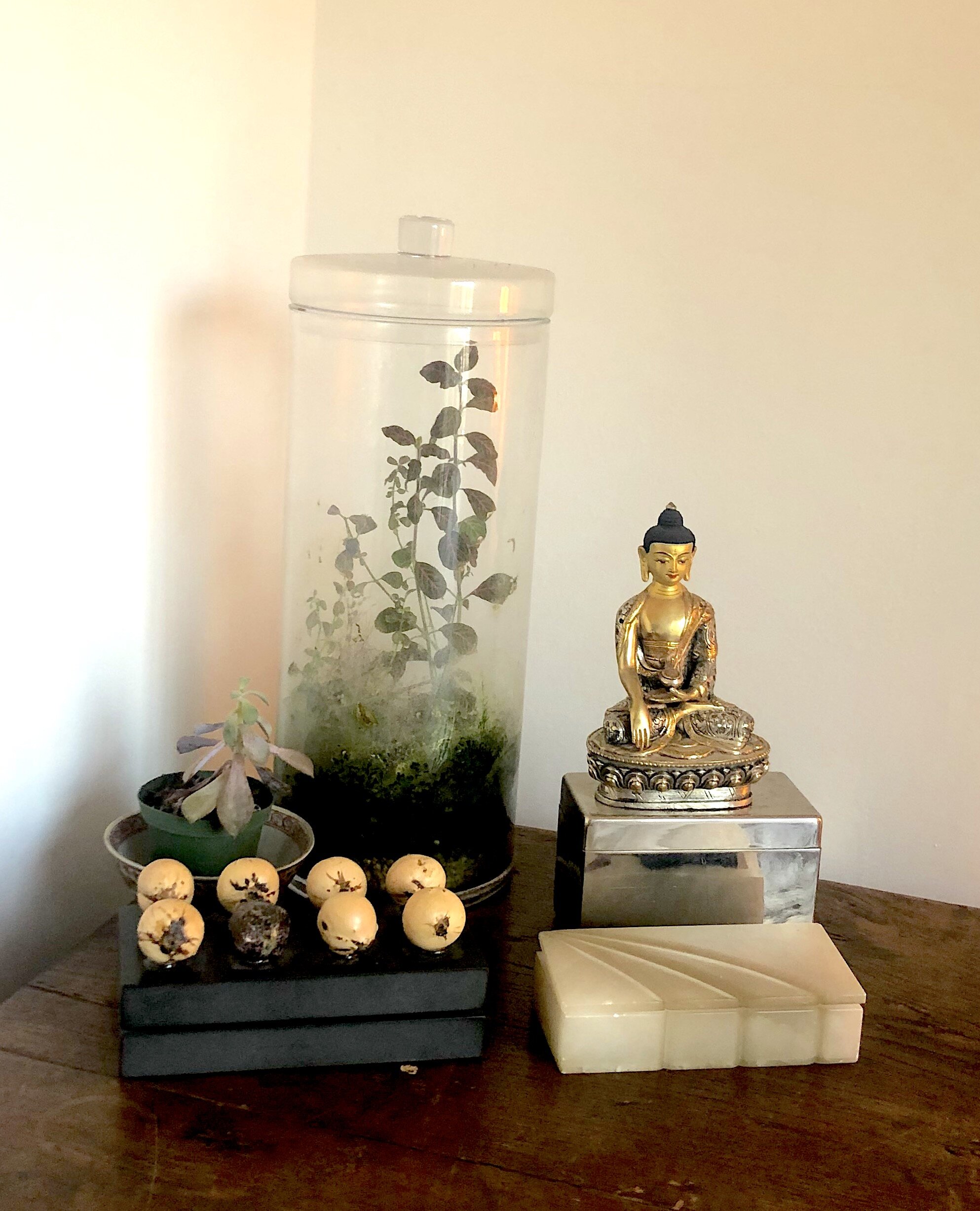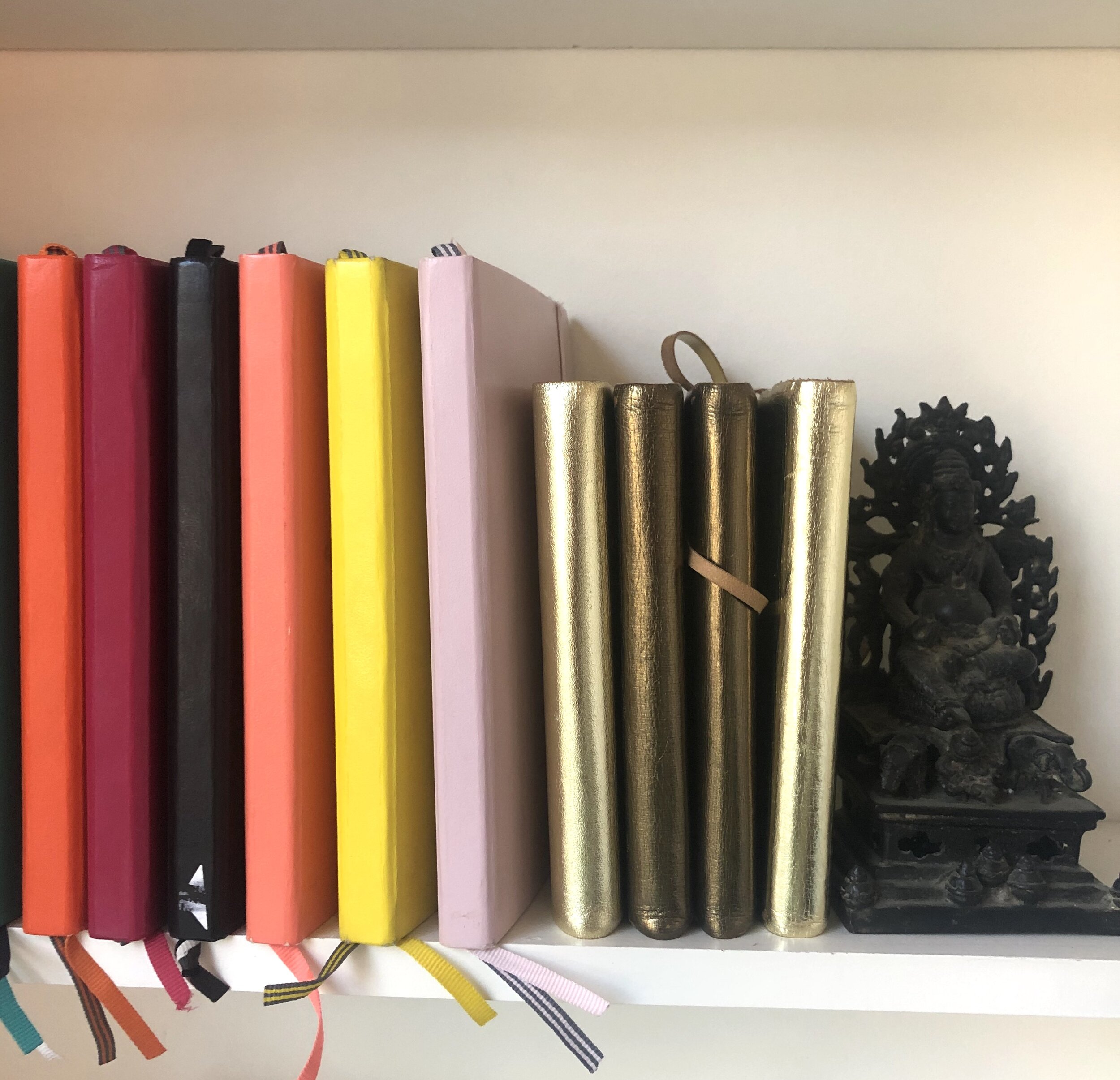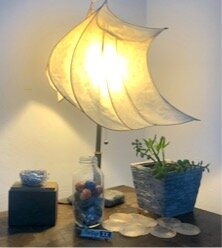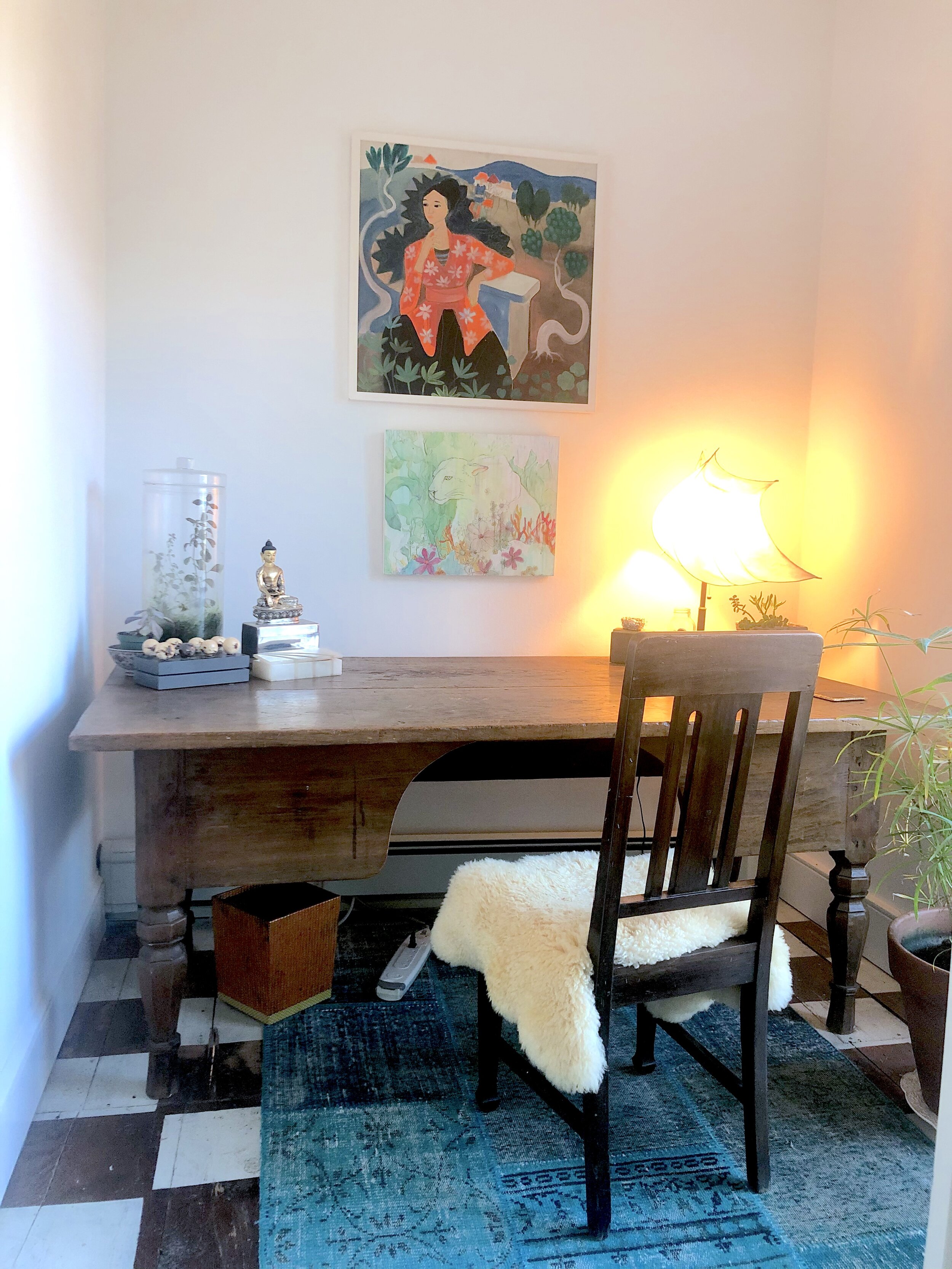No. 4 - On Creating Beyond Fear - Elizabeth Gilbert
This interview is excerpted from Studio Visits, a monthly offering to deepen your creative practice through intimate conversations with some of our favorite writers and artists.
We follow a community-sourced agenda and learn about the tools they use, their earliest creative impulses, how journaling figures into their work, and what keeps them inspired.
Subscribe to catch the next creative conversation.
Last week I had the overwhelming good fortune of interviewing the acclaimed author and brilliant human Elizabeth Gilbert at her church-turned-cozy-abode. (We’re quarantine podmates, so it was covid safe.) She really needs no introduction, but she's the author of many books—Pilgrims, Stern Men, The Last American Man, of course Eat Pray Love, Committed, The Signature of All Things, City of Girls, and Big Magic, which is subtitled “Creative Living Beyond Fear.” As it happened, that was a main focus of our conversation, and it felt so relevant to the work that we've been doing here at the Isolation Journals. It’s also pertinent for any human with an inkling of creative energy. Liz was absolutely dazzling; below you’ll find an excerpt of our conversation, as well as a few snapshots of her work space (pandemic edition).
And if you find Liz’s words as thrilling as I did and want to hear more, you can subscribe to The Isolation Journals newsletter.
And now, as Liz would say, ONWARD!
SULEIKA
I thought I'd start by reading a little passage from Big Magic. This is a very beautiful special edition that I just stole from your bookshelf, and I will try not to drop or spill coffee on it.
LIZ
You can drool on it, as far as I'm concerned. I know how to get more.
SULEIKA
Yeah, you know a guy. So I love this section because it speaks to the fears I have every time I sit down to do anything creative. You write, “Let me list for you some of the many ways in which you might be afraid to live a more creative life: You're afraid you have no talent. You're afraid you'll be rejected or criticized or ridiculed or misunderstood or, worst of all, ignored. You're afraid there's no market for your creativity, and therefore no point in pursuing it. You're afraid somebody else already did it better. You're afraid everybody else already did it better. You're afraid somebody will steal your ideas, so it's safer to keep them hidden forever in the dark. You're afraid you won't be taken seriously. You're afraid your work isn't politically, emotionally, artistically important enough to change anyone's life.”
So over the last couple of weeks, we've been doing something that you're very afraid of. That's its own kind of creative rite, which is plunging into cold water.
LIZ
Yep. Every single day.
SULEIKA
Because we're masochists.
LIZ
No, we're not! Because we're students in Earth school! And one of the things that you come to Earth school to do is to get braver. I hate the cold—I think I hate the cold more than anybody hates the cold. I hate it and I fear it. And knowing that a long dark winter is coming, knowing that the pandemic isn't over, knowing that the days are going to be getting shorter and colder, I thought, I don't want to be so afraid of the cold. I want to go into it. So we started jumping into the Delaware River every day.
SULEIKA
Naked, I might add.
LIZ
The world should be afraid of our nakedness more than we are afraid of cold. But we do it, and it's been amazing and invigorating.
SULEIKA
It has! And before we do it, we do a 35-minute breathing meditation—and my big fear is meditating, because my head can be a dark, twisty place. I have a hard time sitting in silence. So we've both been experimenting on ourselves and our respective fears. And I'm curious: What have you learned about fear, and how has your relationship to fear evolved?
LIZ
This is possibly my favorite thing to talk about in the entire world. So first of all, I just want to lay down a bass note that I am a deeply fearful person. I have always been a deeply anxious person. I was a terrified child. I'm not a daredevil. I don't like adrenaline. I'm afraid for me, I'm afraid for you, I'm afraid for everybody. I'm afraid always. So that's what we're starting with.
But I’m also a really creative person. I was always a really creative kid, and I was always a really curious kid. So in my life, my great good fortune is that I'm one percent more curious than I am frightened of a lot of things. But it's a narrow margin—like an electoral college-ly narrow margin. You don't have to be particularly brave, you just have to be a tiny, tiny bit more interested in something than you are frightened of it. And that has usually helped me.
I've also changed my relationship with fear. I speak to it very lovingly. I have a lot of compassion for it as an entity. Over time, I’ve realized that this isn't a glitch in me. This is a built-in; this came right out of the factory. Fear has an evolutionary mission, which is, “Do not do something new, or that we don't know the outcome of—because it could end in death.” Fear is always going to be present when you try to do anything creative because creativity asks you to try something new, and you don't know what the outcome will be.
That's why, every time you sit down to write, there's this feeling of existential evolutionary terror, where your mind is telling you, “This is gonna end in your bloody death.” Once I realized that's just what it does, I started to say to fear, “You are doing such a good job as fear.” Like, great job! That's your job. Terrific. Thank you. Now let me explain to you gently what creativity is, and what curiosity is.
I talk to fear very, very lovingly, and I allow it to exist. I don't get in a war with it. I used to fight it. I used to think I needed to be braver, and I don't think I need to be braver. I think I need to be kinder and I need to be more curious. And bravery comes from that.
SULEIKA
We talk a lot about fearlessness, as if it's a virtue that we are either born with or that we must learn. But the state of fearlessness feels profoundly unrelatable to me, as someone who also every time I sit down to write anything, including an email, feels as if I'm going to die. But I love the idea of befriending instead of trying to abolish fear.
LIZ
I've met fearless people in my life. They're either fully evolved enlightened masters—of that category, I've only met two—or they are sociopaths. Of that category, I've met many. So fearlessness doesn't come very highly recommended. For the most part, you don't want to be around fearless people. There's something very much missing in their humanity, and they are dangerous to themselves and to others. So I'm not interested in fearlessness. I'm interested in courage, I'm interested in gentleness, and I'm interested in curiosity.
SULEIKA
Were you always this way? Or is this something that you've had to learn?
LIZ
I've had to learn it, because otherwise I couldn't write. It's no less frightening now, on my eighth or ninth book, or whatever it is, than it was on the first. I go through the exact same cycle. It’s like an emotional seasonal cycle.
When you get an idea, here's what you can expect. You're going to get your idea, and the very first experience that you'll have is excitement. That's how ideas land. They come in through a channel called excitement. You get a little hit from it, you get a little high from it. You feel like you're falling in love, or falling off a cliff, and there's a sort of a thrill to it. And then the very next thing that you'll experience is fear. That will come right after it. And again, this is the operating system. Fear will respond with, “I don't know what that is.” And it will start shutting things down.
The only difference between when I was 20 and now is that now I recognize this as the natural progression. And you just have to continue. It's deeply uncomfortable. Every single time I sit down, I think, “I don't know if I still know how to do this.” Always. And yet that tiny, tiny, tiny grain of curiosity is the thing that makes me keep doing it.
What I'm always telling people when they want to start projects and they're scared is—I can't promise you that it's gonna work. I can't promise you that it’ll be good, I can't promise you that anybody will like it, I can't promise you that it will get published. I can't promise you that, if it gets published, it will be well reviewed, I can't promise you that if it's well reviewed, people will purchase it, I can't promise you that if they purchase it, you'll have the capacity to do another one. I can't promise you any of that.
But what I absolutely can promise you is that you will be a different person at the end of that project than you were at the beginning. One hundred percent. That is the reason to do it. Because aren't you a little curious about who you'll be at the end of something? That's why I do it. And sometimes that’s the only thing that makes me do it.
SULEIKA
What does that conversation with fear look like? Is that something that you work out in your journal? Or is it something that you do in your head?
LIZ
Can you hand me that yellow book? I swear we didn't plan this, but I just noticed that my journal is right here. If you guys don't believe me—that I have to work on my fear all the time—this journal is filled with conversations between love and fear. So the way that it happens is that I will let fear speak first, out of respect. So this is, “Dear Liz, I'm your fear. This is what I want to tell you today.” It's like nonviolent communication. Everyone is allowed in the room, and everyone is allowed a voice, and everyone listens to each other respectfully.
So I'm the mediator. I invite fear to come in first. I'm not going to read this to you because it's super intimate. But this is a long list of fears, going on for three pages. And then, because I actually think the antidote to fear is not courage but love, I ask love to come in. Unconditional love. The great mother. Cosmic love. The divine feminine.
I ask, “What would love say to this fearful being?” And what love says is usually some variety of, There's nothing that you can ever do to lose my love. This can be a total disaster, and you'll still have me. If we end up living under a bridge in a cardboard box, I will live there with you. You belong to me. You can't fail at me loving you.
A lot of the time, when I'm really upset, the first thing love will say is, I see how upset you are. I see how frightened you are. I'm right here with you. I have tattooed on my sternum in my own handwriting the words, “I'm right here.” That's the first thing love always says. I'm right here, I've got you, I'm going to be with you no matter what. It's astonishing what it does to my nervous system, even knowing that I'm the one saying it.
That lays the groundwork for me to safely create—because I know that love will not abandon me no matter what. And it doesn't look the way people talk about courage, because it's not a pep talk. My fear will not believe that Vince Lombardi “You can do this, kid!” I've tried that, and it doesn't work—because I'm actually really scared. What I need when I'm scared is not a pep talk. What I need when I'm scared is unconditional, gentle love. And when I bring unconditional, gentle love into the room, fear goes to sleep, like a child in a car seat. It doesn't leave, but it goes to sleep, and creativity can enter the room.
So that’s how I do it. It's not a thing I did once; it's a thing I do. In my office, there are stacks of these journals, and they're all filled with that conversation every single day. And they will be till God leaves Chicago or until I am a fully enlightened being, which might take a minute.
SULEIKA
We might need to plunge in the river for a couple more years.
LIZ
Right? A little bit more breathing, a little bit more freezing. Yes.
SULEIKA
So we have a question about fear from a community member. Karen wrote, “My problem: I struggle with negative cultural voices that say I can't leave the work of the day to sit down at my studio table. I try and then begins the war. Voices tell me I'm not adequate. I'm wasting time, when I could be productive. I am 66, so I come from an era where you were to be a mother and wife, and be fulfilled in that, and make your husband happy always. I don't believe that has to necessarily be so, but as a little girl, I would get lost either in my books or in creating stuff, or I would climb trees and hide up there—only to be reprimanded for escaping. I learned to toe the line and to be a good girl. It’s excruciating to work through the warpath of voices in order to create as I would have as a child.”
LIZ
Okay, first of all, you write like a fucking dream. Can I read the rest of your memoir now? It's so beautiful, and so honest. My friend, Martha Beck, who is a writer and a life coach and a teacher—she’s Oprah's life coach, so people listen to her. Martha has a very simple prescription for living a life of freedom and integrity—which doesn't mean it's easy. There's a difference between simple and easy. A marathon is simple: you run for this number of miles. But that doesn't mean it's easy.
Martha Beck's simple prescription for having a life of total freedom and integrity is this: You have to walk away from two things in order to be free—one, personal family trauma, and two, culture. [Laughs.] That's it. That's it.
Both of them require work to undo the layering. What you’re talking about is in the groundwater. I grew up with a Midwestern farm wife mother, and I also was taught that you are judged by your productivity, your manners, and how you serve others. Your purpose was quite simply this—and it's the purpose of most women in most cultures for most of history—your purpose is to be run dry of your usefulness in service of others until you die. Anything you want to do that isn't that, you are only allowed to do those things in hours or moments you steal away. You best not be taking from anybody or anything else that needs you. Right? That is what culture taught me. That is what family taught me. I had to go through two divorces to shake that. I had to have a lot of spiritual awakenings to shake that. I do not anymore think that that is my purpose.
But now I'm going to give my purpose speech. Can I give my purpose speech? Okay.
So we live in a culture that tells women, you're supposed to be run dry of your usefulness in service of others. But the more general message in a capitalistic, Protestant work ethic society is that you all have one gift within you that you are given by the universe, and your job in life is to find out what that gift is. You’re then to cultivate it, then to become the master of it, then to become the best at it of anybody in the entire world, then to monetize it, then to expand it so that other people can be included so that their lives will be changed by it. No pressure, but that's the fucking brief. That's the brief that everybody in our culture is given, and it is brutal. That is a brutal, brutal instruction manual. Because that is not actually what a human life looks like. It's messier than that. It's more organic than that. We change our interests all the time. Our hearts shift. That is insanity. That is an insane brief.
So here's what I think about purpose. Recently, I was in California, back before the world stopped, and I was walking down the street in Venice Beach. I saw a man at the top of a ladder, painting an awning on his building. I could see that the ladder was not stable, and it made me scared because I'm scared for everyone's physical safety. I was like, Oh, that doesn't look safe. Since I had nowhere else to be, I crossed the street, and I stood and held his ladder. He never saw me. I've probably stood there for half an hour, stabilizing his ladder for him, thinking, This is a perfectly nice way to spend the afternoon. And then, as he started to come down the ladder, and when I saw that he was safe, I left.
As I walked away, I thought, For all I know—because I do not know how the universe works, and neither do you, and neither does anybody else—that could have been the entire purpose of my life. Tell me it isn't. How do we know? As far as I know, in the great master scheme of the universe, I was born and lived and died so that on that day in October in sector seven in this quadrant, I would be walking past the ladder and hold it so that person, whose life was important for other reasons, didn't fall. Every single thing I've done in my life prior to that, or after that, was just killing time. I don't know.
You cannot know what your purpose is—so why not do what you want? The only thing stopping you is culture and family trauma. That requires interior work on your part, to push back, to swim upstream against those voices. That work goes on for the entirety of your life. It requires a wholesale rejection and a willingness to believe that everything you were taught was wrong—that you were misinformed by the uninformed—because they too were taught these toxic, brutal, Calvinistic ideas.
And maybe the thing that has been wanting to guide you this entire time is your curiosity, or your happiness, or whatever makes you feel warm inside, like you've just had vanilla pudding. That feeling is actually your guide for what you're supposed to be doing. It doesn't mean it's going to guide you toward a life where you're going to monetize your talent or transform the world and win a Nobel Prize. It only means that you'll have a nice life.




